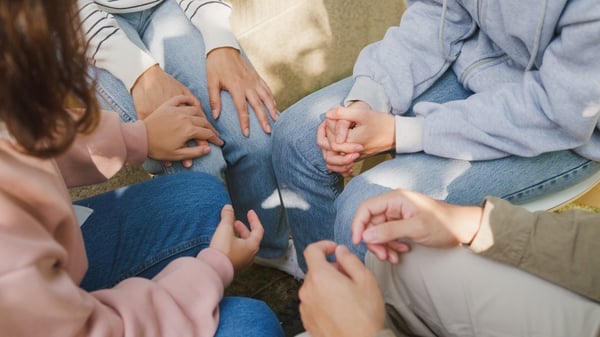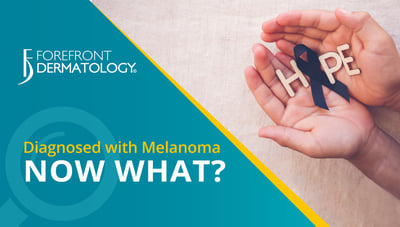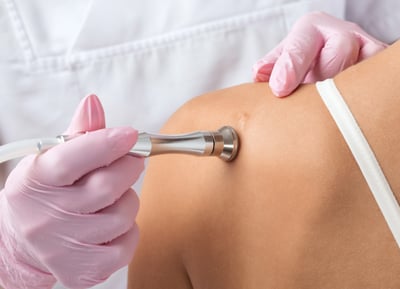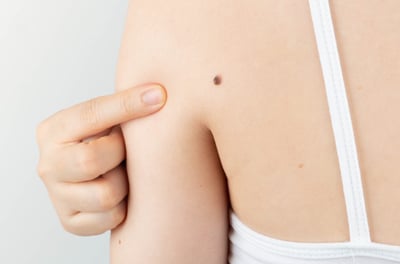
Some things in life can only be understood by others who have gone through the same experience.
From the initial shock of hearing “You have cancer” to anxiety about treatment decisions, to the cautious optimism of recovery, each step in the cancer journey brings a complicated mix of emotions. If you’ve been diagnosed with basal cell carcinoma, squamous cell carcinoma, or melanoma, the range of feelings you are having can be misunderstood by those who aren’t going through the same thing you are. Hearing from those who have been in your shoes can provide validation needed to get through treatment with confidence.
The following patient stories from across the web may help you better understand the wide range of emotions that accompany skin cancer. Whether you’re living with skin cancer yourself or you’re a loved one trying to grasp the emotional toll of cancer, understanding these feelings is an essential part of navigating the journey.
Skin cancer diagnosis, from denial to acceptance
Even after learning of a diagnosis, it can still be hard to acknowledge the news, as this survivor recalls:
“At 34 years old, I was diagnosed with melanoma, which is a term I had never heard before. In an attempt to calm my fears, I searched the internet to learn more about this deadly skin cancer. What I found was a lot of negative news, not a lot of good information about the possibility of beating the odds. I went into denial after that. It took me a few days before I could even accept the diagnosis.”
– Amy, American Academy of Dermatology Association
Even more challenging is the notion that friends and family may not understand the gravity of your feelings, as these survivors experienced:
“Whoever says ‘It’s just skin cancer” is ignorant. Cancer is cancer. Our skin is the body’s largest organ. … It’s scary. You are entitled to feel all the feelings.”
– Anonymous, Reddit
“You’re not being dramatic. I went through the same thing and even heard someone say, ‘It’s just skin cancer.’ That dismissal and minimization over my cancer caused me to rethink that relationship entirely.”
– Anonymous, Reddit
“I’ve been battling skin cancer for 30 years. It’s a lot of being on edge, trying to deal with the disease and putting up with people who still don’t think it’s ‘real cancer.’”
– Lisa, Skin Cancer Foundation
“I’ve had someone laugh about my cancer diagnosis (really!), and while this really upset [me] for a moment, I realized this says more about them than it does about me. I can’t control anyone’s reaction to my situation, but I can control how I react and respond to them.”
– Anonymous, Reddit
While it’s easy to feel misunderstood during this period of the skin cancer journey, finding others going through the same emotions can be extremely helpful. Try connecting with other skin cancer survivors online or through your local treatment center.
Making your way through skin cancer treatment
Even after deciding on a treatment plan – whether that includes Mohs surgery, cryotherapy, surgical removal, chemotherapy, immunotherapy or some combination – the process is often scary and confusing. It’s normal to feel fear, anxiety, hope, and countless other emotions all at the same time, as you make your way through.
“I went through 12 hours of biopsies alone just to determine where it stopped. Some people think skin cancer isn’t a big deal — you just have the doctor ‘cut it out.’ The good news is my doctor was able to get all of the cancer, which was still Stage 2 and had not spread.”
– David, Johnson & Johnson
“I ended up taking oral anxiety meds before going to the hospital, but once my surgeon and anesthesiologist came in talking business, I lost it, and they gave me IV anxiety meds. Despite that, I continued to cry … and I’m fairly certain I woke up crying. … Overall, I’m much calmer post-surgery. I’m still anxious about getting my sentinel lymph node biopsy results back, but I feel hopeful it’s going to come back clear.”
– Anonymous, Reddit
While treatment for skin cancer can certainly be scary, knowledge is power, so ask your treatment team to explain every step of the process. Knowing what to expect and how to approach each challenge can be empowering and help reduce your anxiety going into treatment.
The hope and anxiety of recovery
Of course, life never just goes back to normal after treatment is complete. Many people are faced with anxiety that the cancer will come back, while others are left with the visible reminder of their cancer journey. Take the time to explore how you’re feeling, while learning from others who have traveled the same road.
“There has not been a day that goes by that I don’t think of this beast. I used to cry at least once every day when I’d think about how I was going to die such a terrible death. I don’t cry every day anymore (but on occasion I do!). However, I go to sleep at night with it on my mind and I awake with it on my mind. I feel as if I am walking around with a ticking time bomb.”
– Mary, American Academy of Dermatology Association
“This will be my new life, but I am OK with it. I am here, and for today, I am great. I started (going to) the gym, eating better food, and trying to be just a little selfish. The ups and downs are endless. But I keep a positive attitude, most days. But when I need to, I let the feelings flow, then get back up and start new. We never know how cancer will change us, but it does. We need to be selfish sometimes and do what is best for us. Cancer comes in all colors, races, religions, gender, social status. No one is immune. Support one another. Everyone has their own things they go through, and it is OK.”
– Lori, American Academy of Dermatology Association
Even if you’ve finished with treatment and on the road to recovery, don’t underestimate the value of support groups and connecting with other survivors! Talking with others who have been where you are can provide validation and confidence as you focus on your future.
Embrace all of your emotions, and turn to our experts for help
No doubt about it: A skin cancer diagnosis is almost always an emotional whirlwind that reshapes your perspective, challenges your patience and resilience, and redefines your priorities. As you make your way from diagnosis to treatment to recovery, lean on the experiences of others, and remember you’re never alone on this journey.
Whether you’re concerned about a suspicious mole, need a second opinion on a skin cancer diagnosis, or looking for expert treatment options, take the first step and request an appointment at a Forefront Dermatology location near you today.





